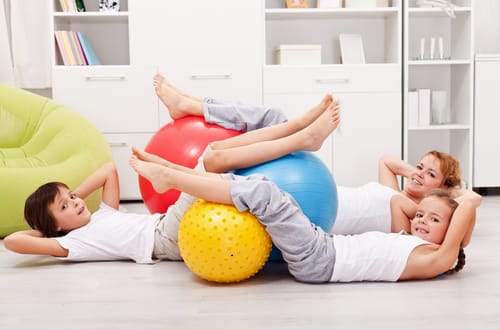Health & Fitness
Fitness is a valuable skill that your child should understand. Kids must know the benefits of healthy habits. Eating healthy foods and staying active helps ward off the risk of debilitating mental illness and physical ailments. Exercise and nutrition also help to increase concentration, and self-esteem and establish regular sleep patterns.
Teach your children about what a personal fitness regimen looks like and help them set up their plan. Even from a young age, kids will pick up on the example you model for them. Include them in your home workout. Take a hike with them or let them laugh with you while they try to do yoga poses. If you go to a gym on the regular, take them with you occasionally. Many gyms, like 24 Hour Fitness have babysitting services available to members who come in to exercise. Toting them along can help to instill good habits of regular fitness early.
Kindness
 Kindness is a simple virtue that many parents teach their children without a conscious plan of doing so. Even when your child is an infant, you encourage the ideas of sharing, greeting people, and giving hugs. As your child grows older, involve him in social service and volunteer projects that help others in need. Arrange for your family to volunteer at a local food bank or shelter, for a day or regularly, so your child can recognize his similarities with other people and strengthen his empathy.
Kindness is a simple virtue that many parents teach their children without a conscious plan of doing so. Even when your child is an infant, you encourage the ideas of sharing, greeting people, and giving hugs. As your child grows older, involve him in social service and volunteer projects that help others in need. Arrange for your family to volunteer at a local food bank or shelter, for a day or regularly, so your child can recognize his similarities with other people and strengthen his empathy.
Help your child’s moral intelligence and capacity for kindness grow through daily example. Assess how you speak with other people, how aware you are of those around you, your reaction to people who are different from yourself, and whether or not your actions represent indifference or entitlement. Conscientious citizens help make the world a stronger and better place, and your child can be one of those people. There are several beautifully written and illustrated children’s books that display the value of kindness and strong ethics. Add a few of them to your library to keep kindness top of mind for your kids.
Academics
Your child will be fully submersed in an academic environment from age 6 through 18. Many children do not fully understand the importance of school or why they must abide by the school system. Show your child a more global perspective of where academics can lead and how they’re applicable in the real world. Set up fun activities for you and your child that incorporate culture, history, and knowledge, like a museum tour, aquarium presentation, or visit to the local college or university. Show your child how the application of knowledge and acquired academic skills makes the world a more fascinating place. There are several city-specific websites, like Parent Map, that have extensive lists of local activities that incorporate the importance of education and learning for children of all ages.





